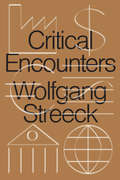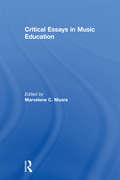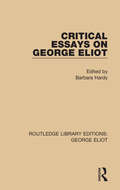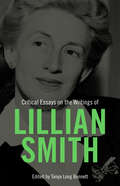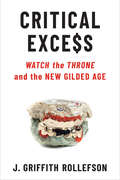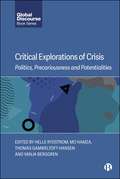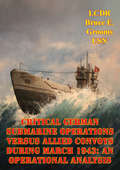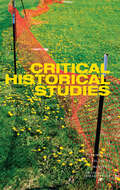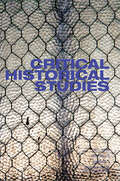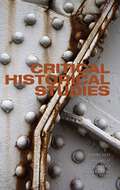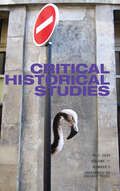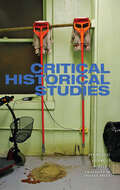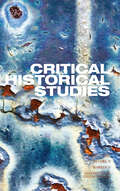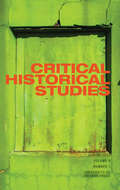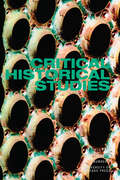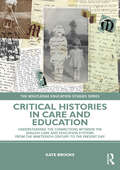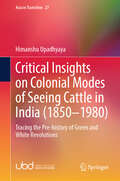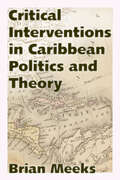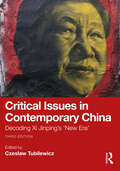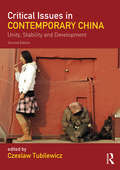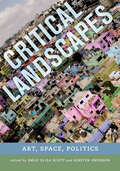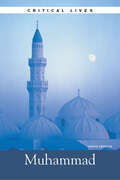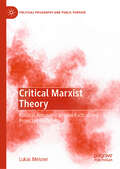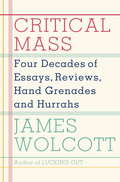- Table View
- List View
Critical Edition of Robert Barnes's A Supplication Vnto the Most Gracyous Prince Kynge Henry The. VIIJ. 1534
by Douglas H. ParkerRobert Barnes (1495-1540) was perhaps the most important sixteenth-century English Protestant reformer after William Tyndale. The shifting religious and political views of Henry VIII positioned Barnes at the opposite end of the popular ideology of the day, culminating in his execution in 1540 soon after that of Thomas Cromwell.A Supplication Vnto the Most Gracyous Prince Kynge Henry The. VIIJ., the first edition of which appeared in 1531 during Barnes's German exile, was a controversial lament for the religious climate in England and an earnest argument in favour of reform. In this critical edition, Douglas H. Parker compares all extant versions of the text published in the sixteenth century, focusing on the differences between the 1531 and 1534 editions. Parker argues that the differences between versions can be explained by Barnes's increasing sensitivity to the unstable theological climate under Henry VIII as well as to the author's attempt to curry favour with the English government in 1534. This critical volume includes the entire 1534 edition of A Supplication, a biographical sketch of Barnes, a bibliographical introduction, a glossary of arcane words, and an appendix that features the 1531 edition, giving readers the chance to make their own comparison. This work is a long over-due study of one of the most fascinating and prescient texts to emerge from the Protestant Reformation.
Critical Encounters: Capitalism, Democracy, Ideas
by Wolfgang StreeckAn anthology of long-read book reviews by one of the European left&’s foremost political economistsFrom the acclaimed author of How Will Capitalism End? comes an omnibus of long-form critical essays engaging with leading economists and thinkers. Critical Encounters draws on Wolfgang Streeck&’s inimitable writing for the London Review of Books and New Left Review, among other publications. It opens with treatments of two contrasting historical eras—factory capitalism and financialization—and three of the world&’s major economies: the United States, France and Germany. A middle section surveys the hollowing out of Western democracies and reviews Yanis Varoufakis&’s &“strange but indispensable&” memoir of the eurozone crisis. Delving into the world of ideas, Streeck discusses the work of Quinn Slobodian, Mark Blyth, Jürgen Habermas and Perry Anderson. Finally, he zooms out to compare his home discipline of sociology to natural history, giving a remarkable and non-deterministic reading of Charles Darwin. In the preface, Streeck reflects on the art (or craft) of book reviewing and the continuing merits of the book form. Critical Encounters also includes a series of &“Letters from Europe,&” penned as the coronavirus descended upon the Continent.
Critical Essays in Music Education
by Marvelene C. MooreThis volume of essays references traditional and contemporary thought on theory and practice in music education for all age groups, from the very young to the elderly. The material spans a broad range of subject areas from history and philosophy to art and music, and addresses issues such as curriculum, pedagogy, assessment and evaluation, as well as current issues in technology and performance standards. Written by leading researchers and educators from diverse countries and cultures, this selection of previously published articles, research studies and book chapters is representative of the most frequently discussed and debated topics in the profession. This volume, which documents the importance of lifelong learning, is an indispensable reference work for specialists in the field of music education.
Critical Essays on George Eliot (Routledge Library Editions: George Eliot #4)
by Barbara HardyThis title, first published in 1970, consists of essays on the individual tales and novels of George Eliot, with two general essays that discuss the novels as a whole and cuts across the individual works. The primary concern of these studies is to see what the limits of George Eliot’s greatness are, to consider the purpose and end of the technical brilliance, and to attend to what she has to say to us across a century of change and developing historical and psychological consciousness. This book will be of interest to students of literature.
Critical Essays on the Writings of Lillian Smith
by Tanya Long BennettContributions by Tanya Long Bennett, David Brauer, Cameron Williams Crawford, Emily Pierce Cummins, April Conley Kilinski, Justin Mellette, and Wendy Kurant Rollins As a white woman of means living in segregated Georgia in the first half of the twentieth century, Lillian Smith (1897–1966) surprised readers with stories of mixed-race love affairs, mob attacks on “outsiders,” and young female campers exploring their sexuality. Critical Essays on the Writings of Lillian Smith tracks the evolution of Smith from a young girls’ camp director into a courageous artist who could examine controversial topics frankly and critically while preserving a lifelong connection to the north Georgia mountains and people. She did not pull punches in her portrayals of the South and refused to obsess on an idealized past. Smith took seriously the artist’s role as she saw it—to lead readers toward a better understanding of themselves and a more fulfilling existence. Smith’s perspective cut straight to the core of the neurotic behaviors she observed and participated in. To draw readers into her exploration of those behaviors, she created compelling stories, using carefully chosen literary techniques in powerful ways. With words as her medium, she drew maps of her fictionalized southern places, revealing literally and metaphorically society’s disfunctions. Through carefully crafted points of view, she offers readers an intimate glimpse into her own childhood as well as the psychological traumas that all southerners experience and help to perpetuate. Comprised of seven essays by contemporary Smith scholars, this volume explores these fascinating aspects of Smith’s writings in an attempt to fill in the picture of this charismatic figure, whose work not only was influential in her time but also is profoundly relevant to ours.
Critical Excess: Watch the Throne and the New Gilded Age (Tracking Pop)
by J. Griffith RollefsonJay-Z and Kanye West’s 2011 Watch the Throne is a self-avowed “luxury rap” album centered on Eurocentric conceptions of nobility, artistry, and haute couture. Critical Excess performs a close reading of the sonic and social commentary on this album, examining how the album alternately imagines and critiques the mutually reinforcing ideas of Europe, nobility, old money, art, and their standard bearer, whiteness. Reading the album alongside Black critical theory and work on the prophetic nature of music, Rollefson argues that through their performance of black excellence, opulence, and decadence, Jay-Z and Kanye West poured gas on the white resentment of the Obama presidency—a resentment that would ultimately spill over into public life, make audible the dog whistling of the Far Right, and embolden white supremacists to come out from under their rocks. Ultimately, Rollefson argues, Jay-Z and Kanye West’s performance of what Rollefson calls “critical excess” on this album exceeds the limits of conspicuous consumption and heralds the final stage of late capitalism—“the New Gilded Age.”
Critical Explorations of Crisis: Politics, Precariousness, and Potentialities (Global Discourse)
by Helle Rydstrom, Mo Hamza, Thomas Gammeltoft-Hansen and Vanja BerggrenClaims to ‘crisis’ reverberate across societal and academic discourses, as people around the world face dire situations and detrimental challenges. Yet, the study of crisis tends to remain siloed and therefore oblivious to the multi-dimensional nature of crisis, which inhibits learning from one type of crisis to the next. Bringing together a broad team of contributors, this book argues for a new interdisciplinary field of crisis studies. Covering a range of cases, the book critically explores the intersections of socio-economic, political, climate, and health factors to unravel the dynamic and transformative forces of crisis. In doing so, the book contributes novel insights into human precariousness and resilience in times of crisis shaped by global—local inequities, ‘post-fact’ discourses, and politics.
Critical German Submarine Operations Versus Allied Convoys During March 1943: An Operational Analysis
by LCDR Bruce E. GroomsGerman submarine operations against allied convoys, during March 1943 is critically analyzed from an operational perspective. The theater commander's operational scheme is dissected for the purpose of identifying lessons which can be applied to the planning and execution of today's theater operations. A brief historical account of the early phases of the war and the events and decisions which preceded the critical convoy battles will be followed by an analysis of the operational scheme employed by Admiral Dönitz. German victory during the spring offensive clearly demonstrated numerous operational successes, a reasonably well conceived operational plan, and proof positive of the potential for a larger scale victory. Yet history recorded Germany's ultimate defeat in the Battle of the Atlantic. This analysis identified three significant flaws which led to the German demise; first, strategic guidance and operational means were inadequately reconciled which prevented the proper execution of the operational plan; second, operational intelligence and reconnaissance were inadequately exploited; third, Germany failed to coordinate and execute joint operations between service arms, specifically the lack of air assets in support of vital U-boat operations. Clearly one must conclude a reasonable operational plan has marginal chance for success when strategic guidance and joint coordination are incompatible with theater objective accomplishment.
Critical Historical Studies, volume 10 number 1 (Spring 2023)
by Critical Historical StudiesThis is volume 10 issue 1 of Critical Historical Studies. Critical Historical Studies is an interdisciplinary journal devoted to historical reflections on politics, culture, economy, and social life. CHS features research on the implications of socio-economic transformations for cultural, political, and social change. In the broad tradition of Critical Theory, CHS will explore the complex connections between cultural form and socio-economic context and promote a reflexive awareness of the researcher’s own position in the history of global capitalist society. The journal aims to foster interdisciplinary exchange among scholars across the entire range of the social sciences and humanities, and publishes work on all historical eras and regions of the world.
Critical Historical Studies, volume 10 number 2 (Fall 2023)
by Critical Historical StudiesThis is volume 10 issue 2 of Critical Historical Studies. Critical Historical Studies is an interdisciplinary journal devoted to historical reflections on politics, culture, economy, and social life. CHS features research on the implications of socio-economic transformations for cultural, political, and social change. In the broad tradition of Critical Theory, CHS will explore the complex connections between cultural form and socio-economic context and promote a reflexive awareness of the researcher’s own position in the history of global capitalist society. The journal aims to foster interdisciplinary exchange among scholars across the entire range of the social sciences and humanities, and publishes work on all historical eras and regions of the world.
Critical Historical Studies, volume 11 number 1 (Spring 2024)
by Critical Historical StudiesThis is volume 11 issue 1 of Critical Historical Studies. Critical Historical Studies is an interdisciplinary journal devoted to historical reflections on politics, culture, economy, and social life. CHS features research on the implications of socio-economic transformations for cultural, political, and social change. In the broad tradition of Critical Theory, CHS will explore the complex connections between cultural form and socio-economic context and promote a reflexive awareness of the researcher’s own position in the history of global capitalist society. The journal aims to foster interdisciplinary exchange among scholars across the entire range of the social sciences and humanities, and publishes work on all historical eras and regions of the world.
Critical Historical Studies, volume 11 number 2 (Fall 2024)
by Critical Historical StudiesThis is volume 11 issue 2 of Critical Historical Studies. Critical Historical Studies is an interdisciplinary journal devoted to historical reflections on politics, culture, economy, and social life. CHS features research on the implications of socio-economic transformations for cultural, political, and social change. In the broad tradition of Critical Theory, CHS will explore the complex connections between cultural form and socio-economic context and promote a reflexive awareness of the researcher’s own position in the history of global capitalist society. The journal aims to foster interdisciplinary exchange among scholars across the entire range of the social sciences and humanities, and publishes work on all historical eras and regions of the world.
Critical Historical Studies, volume 12 number 1 (Spring 2025)
by Critical Historical StudiesThis is volume 12 issue 1 of Critical Historical Studies. Critical Historical Studies is an interdisciplinary journal devoted to historical reflections on politics, culture, economy, and social life. CHS features research on the implications of socio-economic transformations for cultural, political, and social change. In the broad tradition of Critical Theory, CHS will explore the complex connections between cultural form and socio-economic context and promote a reflexive awareness of the researcher’s own position in the history of global capitalist society. The journal aims to foster interdisciplinary exchange among scholars across the entire range of the social sciences and humanities, and publishes work on all historical eras and regions of the world.
Critical Historical Studies, volume 8 number 2 (Fall 2021)
by Critical Historical StudiesThis is volume 8 issue 2 of Critical Historical Studies. Critical Historical Studies is an interdisciplinary journal devoted to historical reflections on politics, culture, economy, and social life. CHS features research on the implications of socio-economic transformations for cultural, political, and social change. In the broad tradition of Critical Theory, CHS will explore the complex connections between cultural form and socio-economic context and promote a reflexive awareness of the researcher’s own position in the history of global capitalist society. The journal aims to foster interdisciplinary exchange among scholars across the entire range of the social sciences and humanities, and publishes work on all historical eras and regions of the world.
Critical Historical Studies, volume 9 number 1 (Spring 2022)
by Critical Historical StudiesThis is volume 9 issue 1 of Critical Historical Studies. Critical Historical Studies is an interdisciplinary journal devoted to historical reflections on politics, culture, economy, and social life. CHS features research on the implications of socio-economic transformations for cultural, political, and social change. In the broad tradition of Critical Theory, CHS will explore the complex connections between cultural form and socio-economic context and promote a reflexive awareness of the researcher’s own position in the history of global capitalist society. The journal aims to foster interdisciplinary exchange among scholars across the entire range of the social sciences and humanities, and publishes work on all historical eras and regions of the world.
Critical Historical Studies, volume 9 number 2 (Fall 2022)
by Critical Historical StudiesThis is volume 9 issue 2 of Critical Historical Studies. Critical Historical Studies is an interdisciplinary journal devoted to historical reflections on politics, culture, economy, and social life. CHS features research on the implications of socio-economic transformations for cultural, political, and social change. In the broad tradition of Critical Theory, CHS will explore the complex connections between cultural form and socio-economic context and promote a reflexive awareness of the researcher’s own position in the history of global capitalist society. The journal aims to foster interdisciplinary exchange among scholars across the entire range of the social sciences and humanities, and publishes work on all historical eras and regions of the world.
Critical Histories in Care and Education: Understanding the Connections Between the English Care and Education Systems from the Nineteenth Century to the Present Day (The Routledge Education Studies Series)
by Kate BrooksThis groundbreaking and thought-provoking book puts the care experience at the centre of education history. Engaging and accessible, Critical Histories in Care and Education provides historical insight to the growing field of care studies and reveals how nineteenth-century assumptions and prejudices about care-experienced pupils helped shape education policy and continue to do so today.Drawing together original archive research with critical theory and written by an academic researcher and writer who is a foster carer herself, the book challenges some of the key myths and stereotypes involving the care experience and shines an illuminating light on their origins. Aimed primarily at undergraduate and postgraduate students in education, this book identifies discursive threads and provides a fresh insight through a critical retelling of the history of the care system. In combining the histories of care and education, it challenges some taken-for-granted assumptions about both. Throughout the book, students are invited to critically examine relationships between gender, class, care and work, and how they continue to impact on the role today.The book is a vital resource for anyone involved in studying childhood, education, welfare and care, and will appeal to anyone wanting to broaden their knowledge and critical understanding of this complex topic.
Critical Insights on Colonial Modes of Seeing Cattle in India: Tracing the Pre-history of Green and White Revolutions (Asia in Transition #27)
by Himanshu UpadhyayaThis book traces the contours of the symbiotic relationship between crop cultivation and cattle rearing in India by reading against the grain of several official accounts from the late colonial period to the 1980s. It also skillfully unpacks the multiple cultural expressions that revolve around cattle in India and the wider subcontinent to show how this domestic animal has greatly impacted political discourses in South Asia from colonial times, into the postcolonial period. The author begins by demonstrating the dependence between the nomadic cattle breeder and the settled cultivator, at the nexus of land-livestock-agriculture, as indicated in the writings of Sir Albert Howard, who espoused some of the most sophisticated ideas on integration, holism, and mixed farming in an era when agricultural research was marked by increasing specialisation and compartmentalisation. The book springboards with the views of colonial experts who worked at imperial science institutions but passionately voiced dissenting opinions due to their emotional investment in the lives of Indian peasants, of whom Howard was a leading light. The book presents Howard and his contemporaries’ writings to then engage contemporary debates surrounding organic agriculture and climate change, tracing the path out of the treadmill of industrial agriculture and factory farming. In doing so, the book shows how, historically, animal rearing has been critically linked to livelihood strategies in the Indian subcontinent. At once a dispassionate reflection on the role played by cattle and water buffaloes in not just supporting farm operations in the agro-pastoral landscape, but also in contributing to millions of livelihoods in sustainable ways while fulfilling the animal protein in the Indian diet, the book presents contemporary lessons on development perspectives relating to sustainable and holistic agriculture. A rich and sweeping treatment of this aspect of environmental history in India that tackles the transformations prompted by the arrival of veterinary medicine, veterinary education and notions of scientific livestock management, the book is a rare read for historians, environmentalists, agriculturalists, development practitioners, and animal studies scholars with a particular interest in South Asia.
Critical Interventions in Caribbean Politics and Theory (Caribbean Studies Series)
by Brian MeeksThese essays by Brian Meeks, a noted public intellectual in the Caribbean, reflect on Caribbean politics, particularly radical politics and ideologies in the postcolonial era. But his essays also explain the peculiarities of the contemporary neo-liberal period while searching for pathways beyond the current plight. In the first chapters, titled “Theoretical Forays,” Meeks makes a conscious attempt to engage with contemporary Caribbean political thought at a moment of flux and search for a relevant theoretical language and style to both explicate the Caribbean’s recent past and confront the difficult conditions of the early twenty-first century. The next part, “Caribbean Questions,” both retrospective and biographical, retraces the author’s own engagement with the University of the West Indies (UWI), the short-lived but influential Caribbean Black Power movement, the work of seminal Trinidadian thinker and activist Lloyd Best, Cuba’s relationship with Jamaica, and the crisis and collapse of the Grenadian Revolution. As evident in its title, “Jamaican Journeys,” the concluding section excerpts and extracts from a longer, more sustained engagement with Jamaican politics and society. Much of Meeks’ argument builds around the notion that Jamaica faces a crucial moment, as the author seeks to chart and explain its convoluted political path and dismal economic performance over the past three decades. Meeks remains surprisingly optimistic as he suggests that despite the emptying of sovereignty in the increasingly globalized world, windows to enhanced human development might open through policies of greater democracy and popular inclusion.
Critical Issues in Contemporary China: Decoding Xi Jinping’s ‘New Era’
by Czeslaw TubilewiczThe third edition of Critical Issues in Contemporary China offers an in-depth and up-to-date analysis of Xi Jinping’s strategies to address critical domestic and international challenges facing China in a ‘new era’.This book joins the current debates about Xi Jinping’s ‘new era’, reflecting upon the continuity and change in the CCP’s domestic and foreign policies under Xi’s leadership and Xi’s capacity to realize the Chinese Dream of national rejuvenation. The international team of contributors evaluate such pressing issues as: Xi’s re-centralization of power and securitization of domestic politics the Chinese economic model state-civil society relations Xi’s gender policy and return to the traditional family values Beijing’s responses to unrest in Xinjiang and Hong Kong Xi’s evolving unification strategies towards Taiwan the Belt and Road Initiative, and the deterioration of US-China relations. Providing readers with rich empirical assessment of Xi’s responses to the political, economic, social and international challenges facing contemporary China, the third edition of Critical Issues will be an essential resource for students of Chinese politics, economy, society and foreign relations.
Critical Issues in Contemporary China: Unity, Stability and Development
by Czeslaw TubilewiczCritical Issues in Contemporary China: Unity, Stability and Development comprehensively examines key problems crucial to understanding modern-day China. Organized around three interrelated themes of unity, stability and development, each chapter explores distinct issues and debate their significance for China domestically and for Beijing’s engagement with the wider world. While presenting contending explanatory approaches, contributors advance arguments to further critical discussion on selected topics. Main issues analysed include: political change military transformation legal reforms economic development energy security environmental degradation food security and safety demographic trends migration and urbanization labour unrest health and education social inequalities ethnic conflicts Hong Kong’s integration cross-Strait relations. Given its thorough and up-to-date assessment of major political, social and economic challenges facing China, this fully revised and substantially expanded new edition is an essential read for any student of Chinese Studies.
Critical Landscapes: Art, Space, Politics
by Emily Eliza Scott and Kirsten SwensonFrom Francis Alÿs and Ursula Biemann to Vivan Sundaram, Allora & Calzadilla, and the Center for Urban Pedagogy, some of the most compelling artists today are engaging with the politics of land use, including the growth of the global economy, climate change, sustainability, Occupy movements, and the privatization of public space. Their work pivots around a set of evolving questions: In what ways is land, formed over the course of geological time, also contemporary and formed by the conditions of the present? How might art contribute to the expansion of spatial and environmental justice? Editors Emily Eliza Scott and Kirsten Swenson bring together a range of international voices and artworks to illuminate this critical mass of practices. One of the first comprehensive treatments of land use in contemporary art, Critical Landscapes skillfully surveys the stakes and concerns of recent land-based practices, outlining the art historical contexts, methodological strategies, and geopolitical phenomena. This cross-disciplinary collection is destined to be an essential reference not only within the fields of art and art history, but also across those of cultural geography, architecture and urban planning, environmental history, and landscape studies.
Critical Lives: Muhammad
by Yahiya EmerickMuhammad was a religious visionary and political leader. Raised in the harsh Arabian Peninsula and orphaned while still a child, this unlikely leader and military genius received a calling to transform his society from a collection of raiding tribes into one of the world's most progressive societies. His message of monotheism and righteousness motivated an entire people to abandon idolatry and spread the word of God to surrounding nations. Although he was a military genius, his greatest accomplishments came from the religion he preached: Islam, which called its adherents to lead a life of prayer, charity, and contemplation. The second largest religion in the world, both Islam's prophet and its values are today often misunderstood by adherents and outsiders alike.This concise, informative biography explores: • Muhammad's background and boyhood, as well as the culture and society in which he lived • A look at Muhammad as a family man, and how his personal life was a testament to his high regard for women • Muhammad's mission as a prophet and his new religion's philosophy on topics ranging from monotheism to interfaith relations • The Qur'an and how it was revealed, how Muslims view it in their religious life, and the concept of Jihad from Muhammad's perspectiveThe Critical Lives series takes a biographical look at pivotal, fascinating people and a critical look at the work and accomplishments that, rightly or wrongly, made them unique, influential, and enduring. Discover the events that shaped their lives and how they came to shape our world.
Critical Marxist Theory: Political Autonomy and the Radicalising Project of Modernity (Political Philosophy and Public Purpose)
by Lukas MeisnerThis book argues why Critical Theory – as first developed in the Zeitschrift für Sozialforschung – must be updated to help us tackling today&’s capitalist polycrisis, from economic via political to ecological crises. Yet, following the dissolution of the Institute for Social Research in New York, and the latest with the death of Adorno in 1969 and the death of Marcuse almost exactly ten years later, there has been a &‘domestication&’ of the main strands of the Frankfurt School. To understand and overcome this domestication, the book traces, with the means of philosophy and sociology, its two affirmative steps in a liberal and in a postmodern turn. As an alternative to both, it defends Habermas&’ project of modernity, yet only by disentangling it – in Marxian fashion – from the capitalist process of modernisation. This disentanglement is at the same time a political radicalisation. It is necessary because the cultural-political ideal(s) of the project of modernity – from human autonomy via rational society to qualitative individuality – can only be realised beyond the framework of capitalism. As their conceptual concentrate, the book proposes political autonomy as a key concept confined neither by Kantian or liberal approaches nor by autonomist or operaist traditions. Rather, it draws on thinkers like Herbert Marcuse, Ellen Meiksins Wood, and Martin Hägglund to rephrase Marxist concepts such as social freedom, democratic socialism, and the end of prehistory. In this way, political autonomy is developed both as a legit criterion for justified critique and as the philosophical foundation and emancipatory goal of a pluralist yet transcapitalist Critical Marxist Theory.
Critical Mass
by James WolcottA career-spanning collection of critical essays and cultural journalism from one of the most acute, entertaining, and sometimes acerbic (but in a good way) critics of our timeFrom his early-seventies dispatches as a fledgling critic for The Village Voice on rock 'n' roll, comedy, movies, and television to the literary criticism of the eighties and nineties that made him both feared and famous to his must-read reports on the cultural weather for Vanity Fair, James Wolcott has had a career as a freelance critic and a literary intellectual nearly unique in our time. This collection features the best of Wolcott in whatever guise--connoisseur, intrepid reporter, memoirist, and necessary naysayer--he has chosen to take on. Included in this collection is "O.K. Corral Revisited," a fresh take on the famed Norman Mailer-Gore Vidal dustup on The Dick Cavett Show that launched Wolcott from his Maryland college to New York City (via bus) to begin his brilliant career. His prescient review of Patti Smith's legendary first gig at CBGB leads off a suite of eyewitness and insider accounts of the rise of punk rock, while another set of pieces considers the vast cultural influence of the enigmatic Johnny Carson and the scramble of his late-night successors to inherit the "swivel throne." There are warm tributes to such diverse figures as Michael Mann, Sam Peckinpah, Lester Bangs, and Philip Larkin and masterly summings-up of the departed giants of American literature--John Updike, William Styron, John Cheever, and Mailer and Vidal. Included as well are some legendary takedowns that have entered into the literary lore of our time. Critical Mass is a treasure trove of sparkling, spiky prose and a fascinating portrait of our lives and cultural times over the past decades. In an age where a great deal of back scratching and softball pitching pass for criticism, James Wolcott's fearless essays and reviews offer a bracing taste of the real critical thing.

